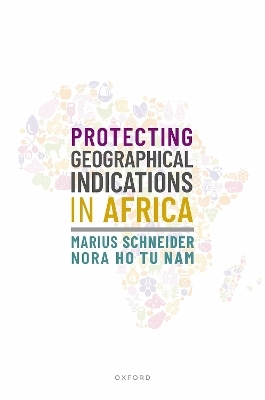
Protecting Geographical Indications in Africa
Oxford University Press (Verlag)
978-0-19-286446-8 (ISBN)
Home to emerging economies, a growing middle class, and the world's youngest population, Africa presents exciting opportunities for high-value products, including products bearing a geographical indication (GI). A GI is a sign used on products that have a specific geographical origin and possess qualities or a reputation due to that origin.
From a niche topic of interest to a billion-dollar industry, GIs now command centre stage in the field of intellectual property (IP). This is no doubt due to the myriad of benefits associated with GIs, from price premiums to the development of rural areas; the revitalization of agricultural communities; and the expansion of tourism.
It is hardly surprising that many stakeholders in the GI value chain, both from within and outside the continent, show a keen interest in protecting and enforcing GIs. In Africa, producer associations, governments, regulatory authorities, and the judiciary are however limited by the lack of clear information on how best to protect and enforce GIs. This book responds to the need for comprehensive information and practical advice on GIs in Africa.
The first part of the book explores the economic and social opportunities offered by GIs, the legal framework within which African states operate at the international and continental level, and the mechanisms available to protect GIs. The authors adopt an Africa-centric approach, using real-life African examples. They propose a balanced discussion around GIs, remaining mindful of African interests and commitments.
The second part of the book provides a detailed overview of the laws and regulations regarding GIs in the two main regional IP organizations in Africa--the African Intellectual Property Organization (Organisation Africaine de la Propriété Intellectuelle, 'OAPI') and the African Regional Intellectual Property Organization (ARIPO)--as well as in eleven African states: Algeria, Angola, Botswana, the Democratic Republic of Congo, Egypt, Ethiopia, Kenya, Mauritius, Morocco, Nigeria, and South Africa.
The structure adopted by the authors allows readers to look up the factual background of the relevant jurisdiction, its legal framework, the applicable registration procedures, and enforcement mechanisms. The book guides experienced readers and newcomers through the topic of GIs in Africa.
Marius Schneider is the founder and director of IPvocate Africa Legal Advisers (IPvocateAfrica.com), an intellectual property boutique law firm that assists clients in protecting, managing, and enforcing intellectual property rights in all African countries. He has over 25 years of experience, of which more than 20 years in an African environment. He is an attorney-at-law at the Brussels Bar and a legal adviser in Mauritius. Marius is one of the editors of Oxford University Press's Journal of Intellectual Property Law & Practice (academic.oup.com/jiplp), the author of numerous publications in the field of intellectual property rights, and a regular speaker at conferences and seminars. Nora Ho Tu Nam is a partner at IPvocate Africa Legal Advisers (IPvocateAfrica.com), an intellectual property boutique law firm that assists clients in protecting, managing, and enforcing IP rights in all African countries. She assists clients throughout Africa, focusing on anti-counterfeiting and copyright matters. Nora is a published author and a seasoned speaker at conferences on intellectual property rights. She holds a Masters in Law cum laude and a Doctorate in Law from the University of Pretoria, South Africa.
1: Introduction to Geographical Indications with a Focus on Africa
2: International Legal Framework for the Protection of Geographical Indications in Africa
3: Geographical Indications and Trade Marks
4: The African Regional Intellectual Property Organization*
5: The African Intellectual Property Organization
6: Algeria
7: Angola
8: Botswana
9: Democratic Republic of the Congo
10: Egypt
11: Ethiopia
12: Kenya
13: Mauritius
14: Morocco
15: Nigeria
16: South Africa
17: Conclusion
| Erscheinungsdatum | 05.06.2024 |
|---|---|
| Verlagsort | Oxford |
| Sprache | englisch |
| Maße | 162 x 240 mm |
| Gewicht | 566 g |
| Themenwelt | Geisteswissenschaften ► Geschichte ► Regional- / Ländergeschichte |
| Recht / Steuern ► EU / Internationales Recht | |
| Recht / Steuern ► Wirtschaftsrecht ► Urheberrecht | |
| Wirtschaft ► Volkswirtschaftslehre | |
| ISBN-10 | 0-19-286446-7 / 0192864467 |
| ISBN-13 | 978-0-19-286446-8 / 9780192864468 |
| Zustand | Neuware |
| Haben Sie eine Frage zum Produkt? |
aus dem Bereich


